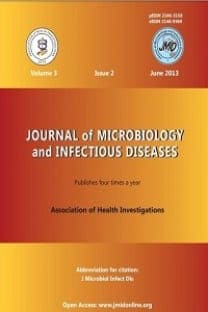Clinical and microbiological impact of inhaled tobramycin treatment on cystic fibrosis patients with Pseudomonas aeruginosa
HIV, HCV, Genotype, Co-infection, Viral load,
___
- 1. Strausbaugh SD, Davis PB. Cystic fibrosis: a review of epidemiology and pathobiology. Clin Chest Med 2007, 28:279-288. 2. De Boeck K, Zolin A, Cuppens H, Olesen HV, Viviani L. The relative frequency of CFTR mutation classes in European patients with cystic fibrosis. J Cyst Fibros 2014, 13:403-409. 3. Troxler RB, Hoover WC, Britton LJ, Gerwin AM, Rowe SM. Clearance of initial mucoid Pseudomonas aeruginosa in patients with cystic fibrosis. Pediatr Pulmonol 2012, 47:1113-1122. 4. Hauser AR, Jain M, Bar-Meir M, McColley SA. Clinical significance of microbial infection and adaptation in cystic fibrosis. Clin Microbiol Rev 2011, 24:29-70. 5. Vazquez-Espinosa E, Giron RM, Gomez-Punter RM, et al. Long-term safety and efficacy of tobramycin in the management of cystic fibrosis. Ther Clin Risk Manag 2015, 11:407-415. 6. Lipuma JJ. The changing microbial epidemiology in cystic fibrosis. Clin Microbiol Rev 2010, 23:299-323. 7. Pritt B, O'Brien L, Winn W. Mucoid Pseudomonas in cystic fibrosis. Am J Clin Pathol 2007, 128:32-34. 8. Barclay ML, Begg EJ, Chambers ST, Thornley PE, Pattemore PK, Grimwood K. Adaptive resistance to tobramycin in Pseudomonas aeruginosa lung infection in cystic fibrosis. J Antimicrob Chemother 1996, 37:1155-1164. 9. Lahiri T, Hempstead SE, Brady C, et al. Clinical Practice Guidelines From the Cystic Fibrosis Foundation for Preschoolers With Cystic Fibrosis. Pediatrics 2016, 137. 10. Gozdzik J, Cofta S, Piorunek T, Batura-Gabryel H, Kosicki J. Relationship between nutritional status and pulmonary function in adult cystic fibrosis patients. J Physiol Pharmacol 2008, 59 Suppl 6:253-260. 11. Bryant JM, Grogono DM, Greaves D, et al. Whole-genome sequencing to identify transmission of Mycobacterium abscessus between patients with cystic fibrosis: a retrospective cohort study. Lancet 2013, 381:1551-1560. 12. Qvist T, Pressler T, Hoiby N, Katzenstein TL. Shifting paradigms of nontuberculous mycobacteria in cystic fibrosis. In: Respir Res; 2014:41. vol 15.]
- ISSN: 2146-3158
- Başlangıç: 2011
- Yayıncı: Sağlık Araştırmaları Derneği
Francesca DİCKHAUS, Mutasim Abu HASAN, Elizabeth TREMBLAY, Kenneth KLİNKER, Kenneth RAND, Stacy G. BEAL
Christine SCARSBROOK, Nadeem Sajjad RAJA, Michael HARDMAN, Kath HUGHES
Yu Jun Wong, Bee Xian Tan, Maciej Piotr Chlebicki, Brian John Schwender
N. Dhaneshwor Singh, Nishi Sharma, Lobzang Dawa, Shalini Malhotra
Shree DHOTRE, Basavraj NAGOBA, Milind DAVANE, Mahesh DHARNE, Namdev SURYAWANSHİ
Parul Punia, Anita Chakravarti, Anjar Ashraf
Nadeem Sajjad Raja, Albena Nikolova, Theo Raudsepp, Simon G Weston- Smith, Annette Rumbold, Sunil Gupta
Arturo González Raya, Eva Martín Salido, Miguel Cantero Sánchez, Gonzalo Callejón Martín, María L. Hortas Nieto
Swati Sharma, Deepshikha Bhowmik, Amitabha Bhattacharjee
Elda QYRA, Edmond PUCA, Arjan HARXHİ, Majlinda KOTE, Pellumb PİPERO
